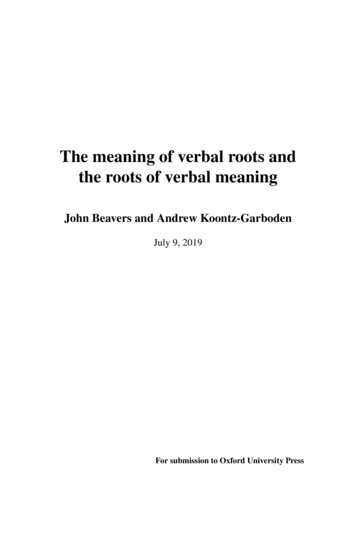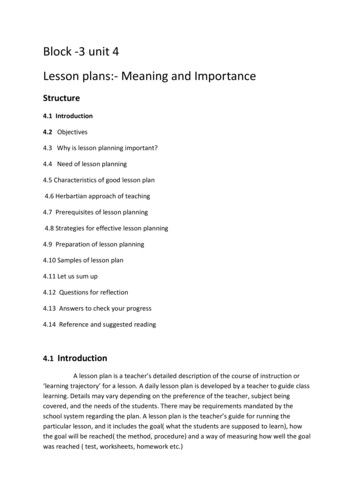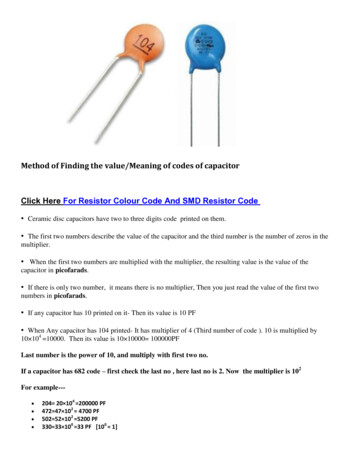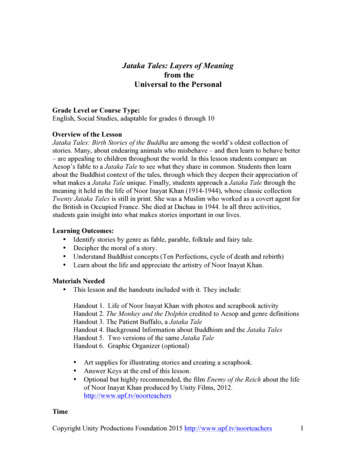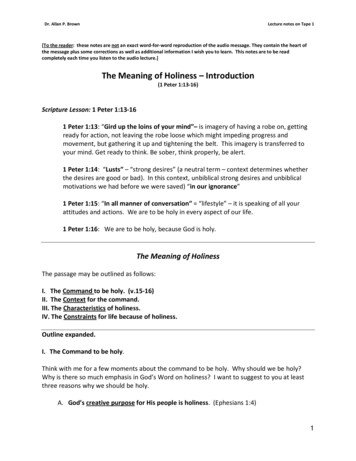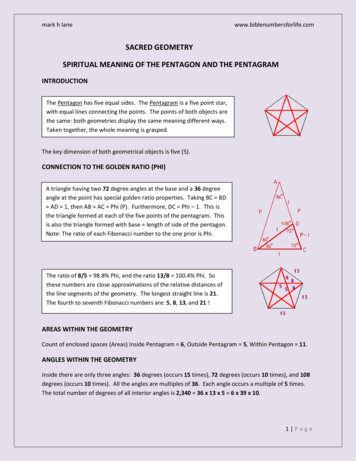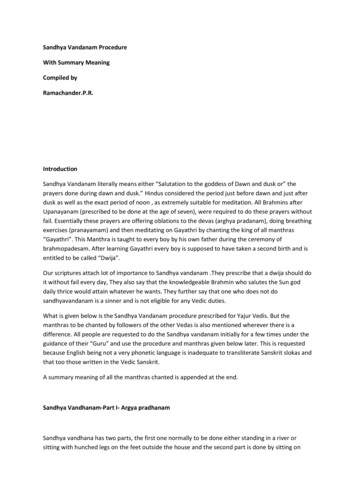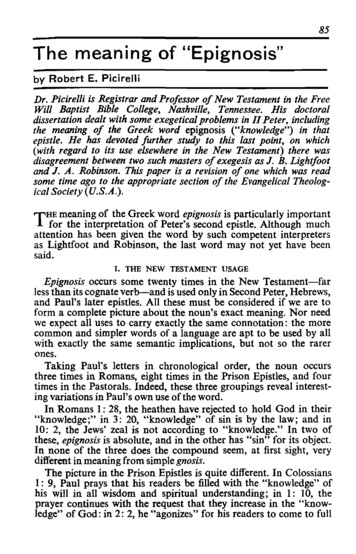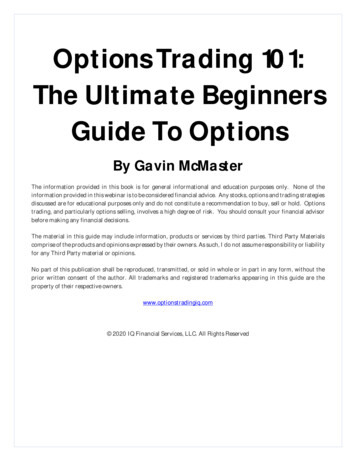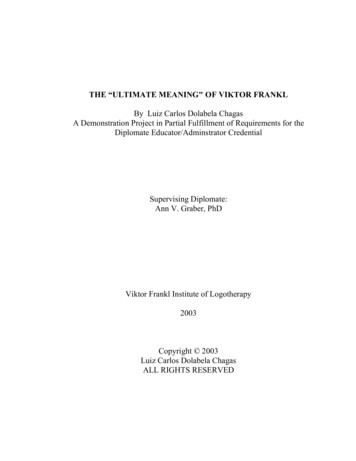
Transcription
THE “ULTIMATE MEANING" OF VIKTOR FRANKLBy Luiz Carlos Dolabela ChagasA Demonstration Project in Partial Fulfillment of Requirements for theDiplomate Educator/Adminstrator CredentialSupervising Diplomate:Ann V. Graber, PhDViktor Frankl Institute of Logotherapy2003Copyright 2003Luiz Carlos Dolabela ChagasALL RIGHTS RESERVED
DEDICATIONI dedicate this work:TO those who are attempting a mind activation for welfare, wisdom andworship (with the finality of enhancing the personality status), in a universalidealistic way to values and concepts;TO those who are searching FOR Truth, Beauty and Goodness, asTHE attributes of GOD perceptible by mankind.ACKNOWLEDGEMENTHere a wish to offer Irmeli Sjolie my sincere “Thank you!”ii
ABSTRACTDuring his entire professional life, Viktor Frankl was balancing his two roleson a razor’s edge: Viktor Frankl, MD, the psychiatrist, on one hand, andViktor Frankl the deeply religious man on the other. By necessity he wasguarded and tried to keep his religious views personal and private.It was only after Viktor Frankl retired and his death was approaching that heclearly stated what he thought and believed. In his last book, Man s Seachfor Ultimate Meaning (published in 1997, the year of his death), he finallytold us what he really meant by "Ultimate Meaning." He was referring tothings related to the soul. THIS IS THE DOOR TO BE OPENED HERE.Coming in contact with the Urantia Book provided deeper insights andunderstanding of concepts like happiness, personality, mind, soul, spirit, andothers addressed by logotherapy for this writer. This study will compareFranklian teaching on these concepts with the teachings on the sameconcepts espoused in the Urantia Book.Particular attention will be given to enlarging our perception of the somaticplane, the psychic plane, and the noetic plane. By expanding our awarenessof the meaning of life, viewing conscience as an integrative tool, powerfultherapeutic interventions could be developed.iii
CONTENTI. INTRODUCTION 1II. WHAT IS LOGOTHERAPY . 7III. THE IMAGE OF MAN 13IV. THE WILL TO MEANING 22V. ON ULTIMATE MEANING . 26VI. CONCLUSION .30REFERENCES 33BIBLIOGRAPHY 34VITA 35iv
IINTRODUCTIONViktor Frankl was an extraordinary person, who lived anextraordinary life. Already as a young boy he was thinking deep thoughtsand holding conversations with "the God within." Viktor Frankl was of theJewish faith. He lived in Vienna, one of the cultural centers of the world.Not only was he the contemporary of Freud, Adler and Jung (and acolleague, being a psychiatrist himself), but also a contemporary of the greatexistentialist philosophers, Husserl, Heidegger and Buber.When the second world war was looming threateningly on thehorizon, Dr. Frankl had a chance to leave Vienna (where he knew he was indanger due to the anti-Semitism of the new regime) and come to the UnitedStates. However, he received a "sign" in the synagogue, which he interpretedas a message to stay in Vienna and take care of his old parents. As aconsequence of this choice, he along with his family, ended up in theconcentration camps, where the parents and his wife died, he survived. Allof these happenings shaped his life and, above all, his life philosophy.Although Frankl’s Logotherapy had been formulated earlier, it was validatedand -- no doubt enriched -- by these subsequent life experiences.v
Some quotes from his last work, Man’s Search for UltimateMeaning (1997), reveal to us Viktor Frankl’s thinking:The irreligious man thus proves to be one who takes hisconscience in its psychological facticity. Facing it as merelyan immanent fact, he stops - stops prematurely - for heconsiders conscience the ultimate ‘to what’ he is responsible.However, conscience is not the last ‘to what’ ofresponsibleness, but the next to last. On his way to find theultimate meaning of life, the irreligious man, as it were, hasnot reached the highest peak, but rather has stopped at thenext to highest. (This, of course, is the way the religious manlooks at the irreligious.) And what is the reason the irreligiousman does not go further? It is because he does not want tolose the ‘firm ground under his feet.’ The true summit isbarred from his vision; it is hidden in the fog, and he does notrisk venturing into it, into this uncertainty. Only the religiousman hazards it. (MSUM, P. 62)From everything he wrote we get the impression that Viktor Frankl isaware of spiritual things; yet, at the same time, we perceive that he knowsmuch more than he is willing to divulge.Our search for Frankl’s understanding of the spiritual nature of man iscontinued through the following quotes taken from Man’s Search forUltimate Meaning:The more religious a man is, the more he will respectthe decision of his fellow man not to go further .However,just as the self cannot be identified with the ego, likewiseconscience cannot be identified with the superego. (P. 62)Many psychoanalysts have interpreted all religionmerely in terms of sublimation and thus have reduced allvi
religious experience, be it conscious or unconscious andrepressed, to infantile sexuality. To this one might say: Noone will be able to make us believe that man is a sublimatedanimal once we can show that within him there is a repressedangel. (P. 65)Truly, self-transcendence is the essence of humanexistence. (P. 138)In a way, the existential vacuum may well be considereda sociogenic neurosis. No doubt, our industrialized society isout to satisfy all human needs.but the most human need -the need to find and fulfill a meaning in our lives -- isfrustrated by this society. (P. 140)That is to say, an ultimate meaning -- paralleling theultimate meaning -- or, to speak in plain words, God, is notone thing among others but being itself or Being (capitalizedby Martin Heidegger). (P. 147)God is the partner of our most intimate soliloquies.That is to say, whenever you are talking to yourself in utmostsincerity and ultimate solitude -- he to whom you areaddressing yourself may justifiably be called God such adefinition circumvents the bifurcation between atheistic andtheistic Weltanschauung. (P. 151)I personally think that either belief in God isunconditional or it is not a belief at all. (P. 152)And finally, quoting Einstein, Frankl tells us: ‘To bereligious is to have found an answer to the question, What isthe meaning of life?’ (P. 153)(Please note: Throughout this paper, quotes by V. Frankl will be presented inbold italics; and quotes from the Urantia material will by italicized.)vii
THE ABOVE QUOTES INDICATE, ONTOLOGICALLYSPEAKING, THAT THIS IS THE KIND OF THINKING THATCORRESPONDS TO VIKTOR FRANKL’S ULTIMATE SEARCH.This study will endeavor to bring greater clarity to V. Frankl’s“Ultimate Meaning” or “the God within” concept. It will attempt to open thedoor to deeper understanding of our relationship to this “God within” bydrawing a complementary comparison with another source of wisdomteaching.The main source for comparison with Viktor Frankl’s teaching in thisstudy will be the Urantia Book (1955). The Urantia Book reveals the highestintellectual, mindal and spiritual concepts ever encountered by this writer. Itclearly describes man’s ontological constitution an all levels of progression.Here we would like to present some quotes from the Urantia materialfor consideration:Knowledge is the sphere of the material or factdiscerning mind. Truth is the domain of the spiritually endowedintellect that is conscious of knowing God. Knowledge isdemonstrable; truth is experienced. Knowledge is a possessionof the mind; truth an experience of the soul, the progressingself. Knowledge is a function of the nonspiritual level; truth is aphase of the mind-spirit level of the universes. The eye of thematerial mind perceives a world of factual knowledge; the eyeof the spiritualized intellect discerns a world of true values.These two views, synchronized and harmonized, reveal theviii
world of reality, wherein wisdom interprets the phenomena ofthe universe in terms of progressive personal experience.(UB, 1955, p. 1435).These enlightened concepts are in opposition to a mere mental and/ormaterialistic approach; they point to the importance of considering spiritualvalues and experiencing them.Furthermore, these ideas, concepts, and value definitions, as they arepresented, give us no other choice than to consider the survival of thepersonality as the main motive of individual search for truth and meaning inthis life. (Please note: what the Urantia Book calls “personality,” ViktorFrankl refers to as “consciousness.”) Let us consider the following:Every human being sooner or later acquires a certainconcept of this world and a certain vision of the next. Now it ispossible, through personality association, to unite these viewsof temporal existence and eternal prospects. (P. 1776)This introduction has pointed to similarities between Franklianthoughts and the Urantia teachings, as well as to subtle differences,primarily to degrees of depth or heights in understanding others, andus, which are ontologically significant.Further comparisons will be made in subsequent chapters thatwill address concepts dear to V. Frankl’s logotherapy, such as “theimage of man,” “the will to meaning,” and “ultimate meaning.”ix
Particular emphasis will be placed on expanding our understanding of“the meaning of life” with its inherent essentiality for developing theintuitive conscience and the need for self-transcendence.x
IIWHAT IS LOGOTHERAPYLogotherapy is the synthesis of Viktor Frankl s thoughts,observations, studies, and experiences. It is a highly personal philosophy,which formed itself slowly during the first 40 years of his life.The essence of this philosophy is that man needs a meaning in life.That he has the will to look for this meaning, and also, the freedom to do so.Without meaning life becomes empty and we fall into an existential vacuum.Frankl names three possibilities through which to find meaning:1) creativity,2) experiences or3) change of attitude.As a philosophy on which therapeutic approaches are based V. Frankl’slogotherapy took a bold step forward at the time of its inception. The mostimportant factor in any analysis of the human personality is not only toconsider the material shadow of this personality (or its material support, thebody), or even the material mind, (nor its somatic side, as some like to refer)but also the personality as a whole, and each of its levels as being asimportant as any other.xi
Formerly, in rough philosophical oversimplification, the spiritual sidewas never included or considered (therefore never studied) in any analysis ofthe mind (undertaken by the so called psychic sciences). We had either ascientific-predetermined point of view or a religionist-spiritual point ofview. And both sides rigidly imposed all this until about two hundred yearsago. The church’s position was to safeguard the inner or spiritual side ofman and science was concerned with outer facts. The Urantia Book remindsus:P. 43 All truth--material, philosophic, or spiritual--isboth beautiful and good. All real beauty--material art orspiritual symmetry--is both true and good. All genuinegoodness--whether personal morality, social equity, or divineministry--is equally true and beautiful. Health, sanity, andhappiness are integrations of truth, beauty, and goodness asthey are blended in human experience. Such levels of efficientliving come about through the unification of energy systems,idea systems, and spirit systems.P. 43 Truth is coherent, beauty attractive, goodnessstabilizing. And when these values of that which is real arecoordinated in personality experience, the result is a high orderof love conditioned by wisdom and qualified by loyalty. Thereal purpose of all universe education is to effect the better coordination of the isolated child of the worlds with the largerrealities of his expanding experience. Reality is finite on thehuman level, infinite and eternal on the higher and divinelevels.An interesting correlation between science, religion andphilosophy is described in the following paragraphs of the Ubook:xii
P.1110 - §5 Science deals with facts; religion isconcerned only with values. Through enlightened philosophythe mind endeavors to unite the meanings of both facts andvalues, thereby arriving at a concept of complete reality.Remember that science is the domain of knowledge, philosophythe realm of wisdom, and religion the sphere of the faithexperience.P.1110 - §8 Both science and religion start out with theassumption of certain generally accepted bases for logicaldeductions. So, also, must philosophy start its career upon theassumption of the reality of three things:1.The material body.The supermaterial phase of the human being, the soulor even the indwelling spirit.2.The human mind, the mechanism forintercommunication and interassociation between spirit andmatter, between the material and the spiritual.3.P.1110 - §12 Scientists assemble facts, philosophers coordinate ideas, while prophets exalt ideals. Feeling andemotion are invariable concomitants of religion, but they arenot religion. Religion may be the feeling of experience, but it ishardly the experience of feeling. Neither logic (rationalization)nor emotion (feeling) is essentially a part of religiousexperience, although both may variously be associated with theexercise of faith in the furtherance of spiritual insight intoreality, all according to the status and temperamental tendencyof the individual mind.In Frankl’s theory we find elements of all three: philosophy, science,and religion even though it may not be explicitly stated. Viktor Frankl’smotive was: to look for meaning, which he considered the primarymotivation for living. He tells us that it is not we who ask life questions, butthat there is a demand quality to Life. It is life that asks us questions and wexiii
have to answer. Our answers must reflect responsible choices based on ourhierarchy of values. To do this, we must arrange our values in the rightorder: The universal, the eternal, the sacred and the material.Please consider these inclusions from the Urantia Book on the subjectof creativity, which figures prominently in logotherapy:P.1220 - §7 You cannot completely control the externalworld--environment. It is the creativity of the inner world that ismost subject to your direction because there your personality isso largely liberated from the fetters of the laws of antecedentcausation. There is associated with personality a limitedsovereignty of will.P.1220 - §9 Ideas may take origin in the stimuli of theouter world, but ideals are born only in the creative realms ofthe inner world.P.1220 - §10 This is the problem: If freewill man isendowed with the powers of creativity in the inner man, thenmust we recognize that freewill creativity embraces thepotential of freewill destructivity. And when creativity is turnedto destructivity, you are face to face with the devastation of eviland sin--oppression, war, and destruction. Evil is a partiality ofcreativity which tends toward disintegration and eventualdestruction. All conflict is evil in that it inhibits the creativefunction of the inner life--it is a species of civil war in thepersonality.P.1221 - §1 Inner creativity contributes to ennoblementof character through personality integration and selfhoodunification. It is forever true: The past is unchangeable; onlythe future can be changed by the ministry of the presentcreativity of the inner self.xiv
Logotherapy is, indeed, a very practical philosophy with its threeavenues to meaning; creativity, experience, and attitude. It can offer greathelp in solving our daily human problems, especially if we expand ourunderstanding of these philosophical concepts.Frankl also has some very definite views on the topic of “happiness.”He maintains that we cannot pursue happiness; the more we run after it, themore it eludes us! Happiness, logotherapy tells us, is a by-product of thesearch for meaning. When we have found meaning in our lives, and we areworking our way towards our goal, then happiness comes by itself – itensues. There is no short cut to happiness. Viktor Frankl did not believe inFreud’s "pleasure principle”; the idea that man was a slave to his instinctsand had to satisfy his urges! That is definitively not happiness!The Urantia Book also expounds on the subject of happiness:(42) Happiness ensues from the recognition of truthbecause it can be acted out; it can be lived. Disappointment andsorrow attend upon error because, not being a reality, it cannotbe realized in experience. Divine truth is best known by itsspiritual flavor.(1217) Evolutionary mind is only fully stable anddependable when manifesting itself upon the two extremes ofcosmic intellectuality--the wholly mechanized and the entirelyspiritualized. Between the intellectual extremes of puremechanical control and true spirit nature there intervenes thatenormous group of evolving and ascending minds whosexv
stability and tranquillity are dependent upon personality choiceand spirit identification.This, if we consider the search for meaning, can be very useful for thereal thinker self in his search to be happy. That is the way of being happyand cosmologically truthful to the human nature. Our moral decisions are themost important element to our fitness in life.P.1220 - §6 Happiness and joy take origin in the innerlife. You cannot experience real joy all by yourself. A solitarylife is fatal to happiness. Even families and nations will enjoylife more if they share it with others.The foregoing paragraph underscored Frankl’s emphasis onexperiential values of encountering others as an avenue to meaning, whilethe following paragraph from the Urantia book summarizes much of whatlogotherapy grapples with and expands our understanding further:P.1097 - §7 But the great problem of religious livingconsists in the task of unifying the soul powers of thepersonality by the dominance of LOVE. Health, mentalefficiency, and happiness arise from the unification of physicalsystems, mind, systems, and spirit systems. Of health and sanityman understands much, but of happiness he has truly realizedvery little. The highest happiness is indissolubly linked withspiritual progress. Spiritual growth yields lasting joy, peacewhich passes all understanding.This, again, amplifies V. Frankl’s postulate in logotherapy that thesearch for ultimate meaning is what our life ought to be about.xvi
IIITHE IMAGE OF MAN:Comparison of Franklian Concept and UrantiaThe treatment proposed by V. Frankl, "the search for meaning",includes concepts about life and the possible change of meaning or scope: tofind a better reason to continue in this battle of life. With the enlightenedunderstanding presented in the preeminent work, The Urantia Book, I wouldlike to expand on Frankl’s image of man.The Urantia Book presents the highest intellectual, mindal andspiritual concepts ever revealed. It depicts mankind’s ontologicalconstitution very clearly: the way man, as a creature, was created. Theseideas, concepts, values and definitions, as they are presented, give us noother choice than to hold the survival of the personality (consciousness) asthe main motive to be considered in any individual search for truth andmeaning in this life.To elucidate further, excerpts from The Urantia Book, which has beenthe main resource of orientation in this work, follow:As stated earlier, every human being acquires a certainview of this world and a certain vision of the next. Now it ispossible trough personality association (1776) to unite theviews of temporal existence and eternal prospects. Thus doesthe mind of one augment its spiritual values by gaining much ofxvii
the insight of the other. In this way men enrich the soul bypooling their respective spiritual possessions. Likewise, in thissame way, man is enabled to avoid that ever-present tendencyto fall victim to distortion of vision, prejudice of viewpoint, andnarrowness of judgment. Fear, envy, and conceit can beprevented only by intimate contact with other minds.Frankl’s dimensional ontology attempts to depict levels of reality. Wecould depart, supported by a basic concept of the self, saying it is composedof three levels of realities: physical (animal and material), mental (theintellectual mind and the cosmic mind) and spiritual. The concept ofdimensional ontology in Logotherapy considers:The somatic planeThe psychic planeThe noetic dimension.I would prefer not to use the word dimension, because it brings acontradictory or illusory impression that there are more dimensions toconsider in reality than those of the material world. There are, indeed otherorders of beings, which are occupying the same space with us, in otherrelations. Therefore, we are not going to mention here “other dimensions.”Instead, we are going to speak of other levels of reality.Seen from another point of view, we have first the ego (which consistsbasically of the animal instincts, and the physical or material level ofxviii
realities), and this ego would roughly correspond to the somatic plane(except that the somatic plane would be a more limiting concept); second,we have the mental self (which can be merely based on the brainendowment, but "mind" here can also evolve as an intellect and reach ahigher level if conducted by the cosmic mind -- if conceiving the mentalcircuits of the universe as benefactors on the growth of the mind). Thismental self is wider than the psychic plane, as envisioned by V. Fanklbecause it is not formed only by the psychic side of the personality (for itcan encounter the cosmic side of the mental universal endowment in theuniverse); third, the spirit. The concept of spirit is also wider than the merelynoetic plane. The spirit, an immaterial kind of endowment, is a fragment ofGod the Father, which is called the Thought Adjuster. This so calledfragment indwells the mortal personality, acts basically by means of themind (through the supralevels of the self), in a way, which is not alwaysquite perceptible by the indwelt mind.According to V. Frankl, man is a three dimensional being consisting of:SpiritPsycheSomaxix
Man has a body and a psyche, but he is a spirit! It is in the spiritualdimension that he has attributes like: love, freedom, responsibility, choice,values, ideas, ideals, etc. The real IMAGE OF MODERN MAN can be:1. Body. The material or physical organism of man. The livingelectrochemical mechanism of animal nature and origin.2. Mind. The thinking, perceiving, and feeling mechanism of the humanorganism. The total conscious and unconscious experience. Theintelligence associated with the emotional life reaching upward throughworship and wisdom to the spirit level. (1779) “The mind of man thusbecomes the mediator between material things and spiritual realities.”3. Spirit. The divine spirit that indwells the mind of man--the ThoughtAdjuster. This immortal spirit has existed before time and space. He is apart and parcel of GOD the Father)--not a personality, though destined tobecome a part of the personality of the surviving mortal creature.4. Soul. The soul of man is an experiential acquirement. As a mortalcreature chooses to "do the will of the Father in heaven," so theindwelling spirit becomes the father of a new reality in humanexperience. The mortal and material mind is the mother of this sameemerging reality. The substance of this new reality is neither material norxx
spiritual. This is the emerging and immortal soul, which is destined tosurvive mortal death and begin the Paradise ascension.Regarding the concept of personality let us look at some ways“personality” can be redefined according to the Ubook:(8) Personality never IS BORN spontaneously; it is thegift of the Paradise Father. Personality is superimposed uponenergy, and it is associated only with living energy systems;identity can be associated with nonliving energy patterns. Butnever does the impersonal directly transmute to the personal.The Universal Father is the secret of the reality of personality,the bestowal of personality, and the destiny of personality."(9) The personality of mortal man is neither body, mind,nor spirit; neither is it the soul. Personality is the onechangeless reality in an otherwise ever-changing creatureexperience; and it unifies all other associated factors ofindividuality. The personality is the unique bestowal which theUniversal Father makes upon the living and associatedenergies of matter, mind, and spirit, and which survives withthe survival of the soul.(141) Love is the secret of beneficial association betweenpersonalities.Before proceeding any further, it becomes necessary to define“personality” and “Thought Adjuster.” The Thought Adjuster, the fragmentof the Father that indwells every mortal of this planet, is prepersonal; and thehumans are personalities. The Thought Adjuster is eternal whereas, "thematerial self has personality and identity, temporal identity; the prepersonalspirit Adjuster also has identity, eternal identity. This material personalityxxi
and this spirit prepersonality are capable of so uniting their creativeattributes as to bring into existence the surviving identity of the immortalsoul." (UB P. 71)This concept in itself will define the status of the person who may ornot be in a state of "misfit" according to this destiny which is prescribed forour mind, by our spirit: from a very high point of view the first symptom ofunhappiness or lack of meaning can be viewed as a bypass of the ego inrelation to this scope of the spirit and the soul.I should add that the very concept of a "Thought Adjuster" in the innermind of a human being is of great philosophical help in understanding theontology of such a This concept makes possible the perception that man hasthe insight, the “thinker” inside himself. It conveys the idea thatdisobedience to cosmic directives, which are from the indwelling spirit ofthe Father, the Thought Adjuster, lead to stagnation; and, that stagnation isthe death of the soul. The inner mandate is: to grow and evolve!Please consider the following:(25) The Paradise spirit that indwells the minds of themortals of time and there fosters the evolution of the immortalsoul of the surviving creature is of the nature and divinity of theUniversal Father. But the minds of such evolutionary creaturesoriginate in the local universes and must gain divine perfectionby achieving those experiential transformations of spiritualattainment (I should add: by means of a material life thatxxii
includes sufferings) which are the inevitable result of acreature's choosing to do the will of (this presence of) theFather in heaven.(1766) When.children once become self-conscious of theassurance of the divine presence(the presence of The ThoughtAdjuster, the fragment of the divinity, inside ourselves, afragment that comes from the First Source and Center, theUniversal Father), such a faith will expand the mind, ennoblethe soul, reinforce the personality, augment the happiness,deepen the spirit perception, and enhance the power to love andbe loved.Of course, it is foreseeable that this ontological data will not beimmediately accepted, even knowing of its ultimate importance. Mosthumans will not immediately or easily adopt this idea. But what about ourLogotherapy colleagues?Since the scientific period of modern life, the specialists studying thephysical organism of man have postponed any deeper or more seriousconsideration about man's personality as a whole. They put aside everyaspect that would be considered spiritual or transcendent, and sometimeseven limiting the human soul to the human biological organism was a habitin Viktor Frankl’s time. This "way of reasoning" had started some hundredsof years ago as a reaction to a "church totalitarianism" that had prevailed formore than a thousand years until then. It corresponded to the later period of a"secular totalitarianism," which largely still prevails.xxiii
This was the historical milieu in which V. Frankl found himself andby which he was influenced. Only in his later years could he write:(MSUM, P. 16-17) Lately, I have come to draw the lineof demarcation between religion and psychiatry ever moresharply. I have learned, and taught, that the differencebetween them is no more nor less than a difference betweenvarious dimensions. From the very analogy with dimensions,however, it should become clear that these realms are by nomeans mutually exclusive. A higher dimension, by definition,is a more inclusive one. The lower dimension is included inthe higher one; it is subsumed in it and encompassed by it.Thus biology is overarched by psychology, psychology bynoology, anal noology by theology.The noological dimension may rightly be defined as thedimension of uniquely human phenomena. Among them,there is one that I regard as the most representativeof the human reality. I have circumscribed this phenomenonin terms of "man's search for meaning." Now, if this iscorrect, one may also be justified in defining religion as man'ssearch for ultimate meaning.And the UBook points out:(42) Philosophers commit their gravest errors when theyare misled into the fallacy of abstraction, the practice offocusing the attention upon one aspect of reality and then ofpronouncing such an isolated aspect to be the whole truth. Thewise philosopher will always look for the creative design whichis behind, and pre-existent to, all universe phenomena. Thecreator thought invariably precedes creative action.V. Frankl continues by stating that it was Albert Einstein who oncecontended that to be religious is to have found an answer to the question,What is the meaning of life? If we subscribe to this statem
The Urantia Book reminds us: P. 43 All truth--material, philosophic, or spiritual--is both beautiful and good. All real beauty--material art or spiritual symmetry--is both true and good. All genuine good
